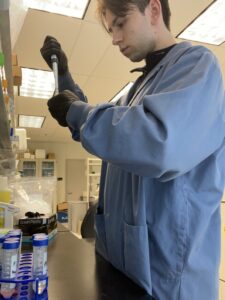“Research is a labour of love,” says Patrick Policicchio as he reflects on the things he has learned in his time at St. Mike’s. Now he is looking ahead to convocation, his work on a double major in health and disease & cell & molecular biology, with a minor in human immunology, complete.

Patrick arrived on campus as a commuter student in 2020 amid Covid protocols and lockdowns. With a virtual orientation and online classes, he found it daunting to meet people. “The initial stages were not easy,” he recalls.
Soon, however, he discovered that everyone was looking for the same thing: human connection.
“We were all like-minded,” he says.
He was able to make friends and get to know classmates fairly quickly, but a key component of his university experience was missing, and that was the opportunity to do lab research, given strict lockdown.
But being a creative thinker, as soon as restrictions eased he started reaching out to professors on his own in search of a research opportunity. In 2022, he found himself in the lab with Dr. Bradly Wouters, senior scientist, Princess Margaret Cancer Centre, and Executive VP Science and Research, University Health Network (UHN). This connection led to the research he has been working on since then, which is, in layperson’s terms, designed to sensitize cells to help them become more receptive to radiation.
“Talk about daunting! It makes your head spin,” he says, recalling his first entry into the lab, where he found himself working with PhDs and medical doctors. “You hunker down and get to work.”
Patrick soon realized that time in such intense and important surroundings would be a true test of whether medical research was the place for him.
“I found out I wanted to go on. I fell in love and realized I belong here,” he says of his lab experience. In time, one of the doctoral students he worked alongside became the supervisor of the undergraduate thesis he recently completed, which explored the relationship between oxygen consumption rate and radiosensitization in Pancreatic Ductal Adenocarcinoma (PDAC).
With that decision confirmed, he began figuring out ways to organize his week for the most productive results. One of the steps he took was to leave his research days free of classes so that he could wait on results because, as he says, “You could be in the lab for one hour or for 14. There’s no way to tell what cells will do,” adding that pre-dawn visits to the lab are now part of his life. “The fun thing about research is that you can set your own agenda.”
The days he did not have classes included not only the data analysis he’s been working on but also taking on tasks like preparing for talks and presentations. As he notes, “part of research is being able to convey your findings in a way that helps make a difference, and being able to apply what I’d been exposed to in classes clearly demonstrates I learned the material.”
In spite of long hours of classes and lab work, Patrick remained mindful of the need for connections and a social life. Even though his own orientation was online, he recognized that it helped launch him into life at St. Mike’s. In gratitude, he became involved in orientation, keen to help new students learn the importance of finding the balance between studying and socializing.
Because of Covid, “my experience on campus was limited. I would have loved more time and I would encourage incoming students to make the most of the social side of St. Mike’s, whether it’s spending time in the Coop, or attending cultural nights, or participating in any of the many events that are happening all the time,” he says.
As he plans his next steps—likely graduate research and then perhaps medical school– he has carved out a special place in his heart for St. Mike’s.
“I have a long family history at St. Mike’s. I remember coming to campus as a kid and asking myself ‘Is this what I want?’ and knowing that it was.”
When he takes a break from his busy schedule, Patrick relaxes by listening to music and engaging in a range of sports, and credits being active with helping him in his research.
“One of my goals is to figure out ways I can be better at everything I do,” he says.
Planning for a future in medicine, his conversation frequently returns to topics such as the importance of personalized treatment and the need to be mindful not only of patients but also of their families, an awareness heightened by his opportunity in 2022 to take part in UHN’s Cancer 360 Program, which helps students in related fields learn more about the various issues cancer patients must contend with. The next step in his long academic journey is U of T’s Medical Biophysics Program. Already, though, this St. Mike’s grad already speaks in a way that offers listeners reassurance that the medical world is in good hands.
More Convocation 2024:
Grad Para Babuharan on Finding His Community
Grad Vanessa Choi on Paying it Forward
St. Mike’s Student Dacian Dawes on Finding her Place
Grad Patrick Elo on Crossing the Finish Line
Grad Caroline McQuade on the Value of Mentors
